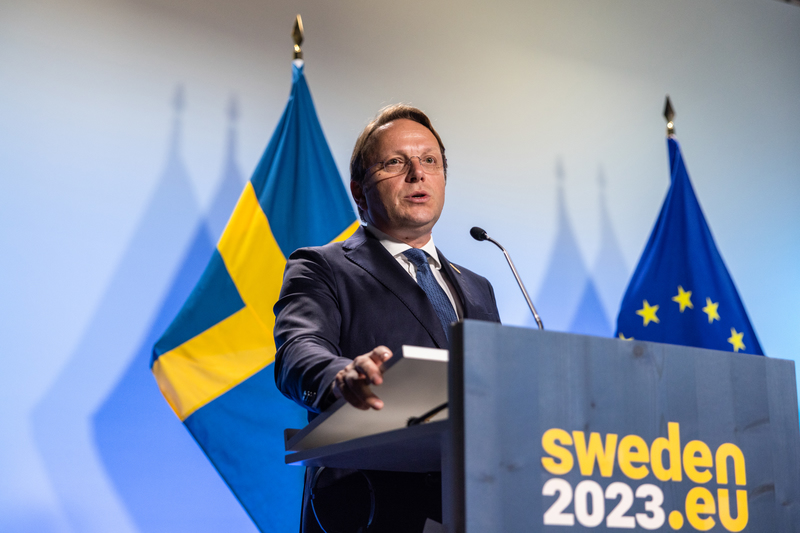The European Commission’s update on the progress made by Ukraine, Moldovia and Georgia, the three Eastern European Partnership countries that applied last year for EU membership, was delivered on Thursday at an informal general affairs council meeting in Stockholm.
Ukraine and Moldova have already been granted candidate status by the European Council while Georgia was offered a European perspective. All three of them need to fulfil a number of conditions or reform priorities to continue to next step in the accession process. For Ukraine 7 priorities were set, for Moldova 9 priorities and for Georgia 12 priorities.
Some member states wanted the EU to speed up the process for in particular Ukraine and report about its process already last Spring before the annual enlargement package in October when the Commission delivers progress or country reports for candidate and potential candidates. This year it will be for 10 countries, six in the Western Balkans, Turkey and the three new accession countries.
Instead, the Commission decided to provide an oral update which will give them some more months to implement the necessary reforms. And more time they need, according to the oral update by the Commissioner for neighbourhood and enlargement, Olivér Várhelyi.
He apparently read the update from a written paper, which was published in the form of press remarks, and described the update as a snapshot of where the countries find themselves in the accession process. At today’s press conference in Brussels, the Commission’s chief spokesperson added that the press remarks reflected the gist of the oral update.
Overall, the Commissioner disappointed the three countries as none of them had completed the majority of their priorities. Ukraine has completed 2 of 7 priorities, Moldova 3 of 9 priorities and Georgia 3 of 12 priorities. That said, they are all more or less on track. He encouraged them to continue the reform process and show that they can deliver on all the priorities.
Ukraine has so far completed two priorities (judiciary and media), achieved good progress on the constitutional court reform and made some progress on the remaining four priorities ( anti-corruption, anti-money laundering, de-oligarchisation, and national minorities).
As regards the rights of national minorities and the use of minority languages, he referred to the recommendations in the Venice Commission Opinion. This issue is not explicitly covered by EU law (the acquis). Instead, the EU are relying on two conventions adopted by the Council of Europe. These rights are not only individual rights but also to some extent collective rights.
Moldova has completed three priorities (judiciary reform, civil society involvement and protection of human rights) and achieved good progress in three other areas (justice reform, de-oligarchisation and public finance management reforms). Most of the work has now to be focused on public administration reforms and fighting corruption and organised crime, where only some progress was achieved.
Georgia has completed three priorities (gender equality and fighting violence against women, European Court of Human Rights judgments, appointing a Public Defender) and achieved some progress in seven other areas (political polarization, electoral framework, judicial reform, anti-corruption, organized crime, protection of human rights, civil society). There was limited progress on de-oligarchisation and no progress on media pluralism.
After years of enlargement fatigue in the EU and democratic backsliding in some of the new member states (Hungary and Poland), Commissioner Olivér Várhely tried to encourage the three countries not to despair and continue their reform programmes.
“My sentiment is that there is a genuine engagement in the Council and among the member states and that enlargement is back on the agenda,” he said at the press conference after the meeting. “Not only is it back on the agenda but has become one of EU’s top priorities. Now is the moment to enter the EU. You know what you have to do so do it.”
With the oral update, the Commission wanted to send a signal to the three countries and motivate them to continue the good work. “This is a unique opportunity from which everyone should profit,” he added. “My advice to the governments concerned is to speed up the work so that our reports in October will be complete (all priorities completely achieved).”
He promised that the Commission stands ready to help the three countries. A Commission spokesperson commented that the Commission will continue with its regular contacts with them and support them. Várhelyi noted that compliance with the priorities are not the only criteria and hinted that there might be political considerations by the Council.
This seemed to be addressed to Ukraine which is fighting for its very existence against Russia’s war of aggression. Ukraine is fighting for democracy, freedom, national independence and peace, the fundamental principles and values behind the European project after WWII and the establishment of the European Community (EC), which would later become the European Union (EU).
The war is obviously the biggest obstacle against Ukraine’s progress in meeting all priorities, he said. “Once the war ends, the preparations for becoming an EU member state will be speeded up.”
European Commission Ursula von der Leyen seemed more upbeat about Ukraine’s progress when she spoke earlier this week in London at the Ukraine Recovery Conference. Referring to the oral update, she said that, “This reporting shows the goal is in sight and we will work with Ukraine to get over the finish line.” She has no doubt that Ukraine will become part of the EU.
Várhelyi, a lawyer by profession, is more focused on the nitty-gritty of the acquis and the new enlargement methodology which he presented in February 2020.
According to this methodology, candidate countries have to comply with the Copenhagen accession criteria from 1993, in particular “fundamentals” such as the rule of law chapters in the acquis, the functioning of democratic institutions and public administration reform as well as the capacity to effectively implement the acquis and the capacity to cope with competition and market forces.
M. Apelblat
The Brussels Times

